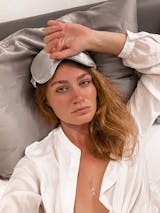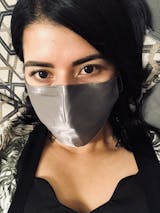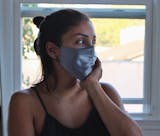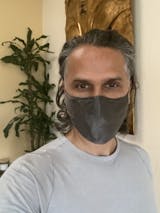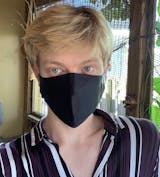Have you ever heard of AFA or Adult Female Acne? You may be wondering why women have an acne condition named after them. Well, it's because adult women suffer more acne than adult men. You can probably guess why right? Yep—Hormones.
Aside from genetics, hormones are the biggest culprit for acne. When we're adolescents, pregnant, with polycystic ovarian syndrome (PCOS), and going through menopause, we're subject to a slew of hormonal symptoms, which can often include acne.
So how can women manage AFA if a hormonal imbalance causes it? In this article, I'm going to shed some light on AFA, and show you some safe and natural ways to manage and hopefully reduce AFA.
What Causes AFA
If you've been paying attention to my blog articles over the past couple of weeks, you may have noticed they're focused on the theme of acne. Acne is a condition that many of us struggle with—50 million Americans, in fact (5)—and because there are so many facets to acne, one article just won't cut it.
In this article, we're focusing on AFA (Adult Female Acne). AFA is defined as one that affects women over the age of 25 and may persist continuously or intermittently from adolescence or manifest for the first time in this period (1). So let's dive in and first talk about the causes of AFA.
As mentioned in my previous blog articles, acne is caused predominantly by genetics and hormones, with stress and medications—and even other factors like diet and environment—often playing a part.
If your mother or father had acne, this would likely be why you also get to experience the joys of acne, particularly during adolescence. If acne is not genetic, but you're now experiencing outbreaks as an adult, it's more than likely the result of a hormonal imbalance.
There are three classifications for adult acne (1,2):
- Persistent Acne
- Late Acne
- Recurrent Acne
Persistent Acne
Persistent acne is when acne begins during adolescence and continues into adulthood with no break in between. This is often a result of either genetics or hormones—or both.
Late Acne
Late acne is when acne presents itself in adulthood with no previous existence, not even during adolescence. This is more likely to be caused by hormones.
Recurrent Acne
Recurrent acne is a newer classification for adult acne, which is present during adolescence, improves for a period, and reappears later in life. Again, this could be either genetic, hormonal—or both.
While extensive study has yet to be done on AFA, there are some contributing factors:
- ultraviolet radiation
- stress
- obesity
- diet
- smoking
- sleep disorders
- cosmetics
- medications
- excessive skin washing
- possible resistance to P. acnes
- endocrine deficiency diseases
Another factor that can increase the likelihood of acne developing as an adult is a deficiency of the epidermal barrier function (1). The epidermal barrier is a mechanism to stop transepidermal water loss (TEWL) from occurring in the skin.
This barrier can become damaged through things like over-exfoliation, using harsh soaps or sulfates, sun exposure, and cold or hot temperatures. The barrier becomes weakened, and the skin's moisture content depletes more rapidly.
Once the skin starts to lose vital moisture, it can become inflamed. Acne is considered an immune-mediated chronic inflammatory disease (3). So if there is a build-up of inflammation within the skin, it can create a haven for acne to flourish.
How Do Hormones Cause Acne?
Our hormones have such an essential role in regulating our bodies. Humans have over 50 hormones, many of which produce minimal amounts (8). The hormones that can affect our skin in adulthood are the ones that are more prevalent during hormonal events, such as PCOS and menopause.
Testosterone—the primary androgen hormone produced in the testes, ovaries, adrenal glands, and fat cells—is responsible for growth and reproduction. This hormone is more dominant in men and found in smaller amounts in women.
When women have a hormonal imbalance, testosterone can spike, causing them to get male-like symptoms, like excess hair and acne breakouts (7).
If estrogen—a female-dominant hormone produced in the ovaries, corpus luteum, and placenta—drops down too low, even if testosterone levels are normal, you may experience acne. The same goes for progesterone—a hormone produced by the ovaries, placenta, and adrenal glands (7).
Other hormones that can cause acne breakouts when imbalanced are:
- insulin and insulin-like growth factor-1
- adrenocorticotropic hormone (ACTH)
- melanocortins
- glucocorticoids
- growth hormone (GH)
- corticotrophin-releasing hormone (CRH)
These hormones work around the clock to keep our bodies regulated and healthy. Unfortunately, women are more susceptible to hormonal imbalances than men, which is why women suffer more from adult acne, which is why they've named it Adult Female Acne.
How Stress Affects Our Skin
When we are stressed, our cortisol levels can spike. When cortisol spikes, it sends a signal to our hypothalamus, which then produces the hormone corticotrophin-releasing hormone (CRH). CRH then stimulates our body's oil and sebum production (6).
When our skin produces excess oil and sebum, our follicles become congested more rapidly. So our skin becomes oilier, or our pores become visibly clogged. We may begin to notice more blackheads, whiteheads, pustules, and other blemishes.
As mentioned earlier, overexposing your skin to UV rays, over-cleansing, or taking certain medications can damage your skin's protective barrier. Add in a hormonal imbalance—like menopause—and you have the perfect environment to grow and harbor acne and inflammation.
So, as you can see, adult acne is often caused by a cascade of events. It doesn't just show up one day for no reason.
Lifestyle and Acne
Something else to point out that can contribute to acne is our lifestyle. A poor diet and a sedentary lifestyle can cause many issues.
A poor diet can cause gut inflammation and contribute to an unhealthy immune system. Being sedentary or immobile for most of your day—like sitting at a computer, then switching to the couch at night—can affect our bodily and mental health. So, of course, this is also going to affect our skin.
A typical diet in America is high in processed foods, refined sugars, and saturated fats while also being low in fresh fruit, vegetables, fish, and fiber (9). This combination is a recipe for disease and hormonal imbalances. So one thing I always advise my clients to do is to clean their diet up.
Reducing and eliminating as many foods from your diet that don't grow in nature is half the battle. Replace refined sugars with natural sweeteners like honey, processed snacks with fruit and vegetables, and plain popcorn.
Eat whole foods, not processed foods. Foods that are lightly baked or steamed to retain their nutrients—not coated in calories and deep-fried in saturated oils.
Meal prep saves money and eliminates the temptation of being lazy and going for the quick and easy option. Convenient foods are usually the most detrimental to our health—unless it's a piece of fruit.
Stop drinking anything that has additives, like soda. Quit smoking tobacco and cut down on alcohol. Do something active every day, even if it's just walking.
Not only will a healthier lifestyle help with your physical health, but it will also improve your mental health. All of which can help with acne.
Managing Hormones
If you're suffering from AFA, but don't know the exact cause, the best way to figure it out is to use the process of elimination. Start by following the lifestyle steps in the previous section. Do one thing at a time, so it isn't overwhelming, and you can form habits gradually over time.
If you're taking medications, ask yourself if you need to be on them. Studies show that many adults are taking medication for conditions that can be managed by improving their diet and lifestyle, such as:
- switching to a plant-based diet (10)
- lowering their BMI
- maintaining physical activity every day
- limiting television time (11)
Hormonal imbalances caused by menopause or PCOS are a little trickier to navigate. I'm not going to pretend to know the best avenue to take here. I read tons of articles on each of these topics. They are extensive and complex, and they really deserve their own article. So I won't dive into them here.
But I will say that making lifestyle changes that are better for you will help all conditions you're currently experiencing. Even if it doesn't heal or stop the symptoms, it will undoubtedly give you a better quality of life.
It's critical to look at your life as a whole and not just treat your unwanted symptoms.
Doctors learn to mask symptoms, so a patient feels better. Just say you are overweight and have high blood pressure. Your doctor may advise you to lose weight, but they'll typically only medicate your high blood pressure.
They don't learn about nutrition and exercise to help you lose weight. Some doctors may do both, but it's not common practice.
In a perfect world, all doctors would prescribe a lifestyle plan, not just medication, that includes diet, exercise, and even a mental health plan. But because doctors are medical experts, not lifestyle experts, it's really up to us to look after our health as a whole.
Sometimes our lifestyle is too overwhelming to change. If you suffer from anxiety or depression, for example, seeking help from a therapist or psychologist could be the best starting point for you.
If you're ready to make changes but don't know where to begin, try seeing a dietician and physical therapist first.
You may need to try a few different things to see what works for you. Chiropractic treatment doesn't work, but give me a deep tissue massage any day. Yet, my husband swears by a Chiropractor and doesn't like deep tissue massage.
Some people like seeing a therapist monthly to hash out their issues, while others prefer a silent Reiki session.
Your body might respond well to power walking seven miles every other day, or maybe your knees are shot, and swimming is the answer.
A low-carb diet may work for your husband, but your body might be better with a Mediterranean diet and intermittent fasting. Different strokes for different folks—find what works for you.
Natural Treatment for Acne
I am a huge advocate for using what mother nature gave us. I genuinely believe that for most conditions humans face, we can find the answer in nature.
I'm not talking about diseases like polio, coronavirus, HIV, or even the invention of antibiotics—although we have a culture of overusing antibiotics (12). These are all medical breakthroughs that we need for our species to survive.
But for things like acne, hyperpigmentation, psoriasis, etc., and other conditions, like IBS (15), IBD (14), and psoriasis (13), the answer can often be found in nature.
Some known natural ingredients for treating acne and inflammation are (16,17):
Calendula
See our range of skincare that contains calendula here.
Aloe
See our range of skincare that contains aloe here.
Chamomile
See our range of skincare that contains chamomile here.
Marshmallow
See our range of skincare that contains marshmallow here.
Green Tea
See our range of skincare that contains green tea here.
Azadirachta indica
See our range of skincare that contains Azadirachta indica here.
Cannabis
See our range of skincare that contains cannabis here.
Rosemary
See our range of skincare that contains rosemary here.
Eucalyptus
See our range of skincare that contains eucalyptus here.
Treat AFA Holistically
Experiencing AFA can be incredibly disheartening and difficult to manage. So start from the basics and manage your symptoms holistically by changing your lifestyle and implementing natural ingredients into your skincare ritual. It will not only improve the symptoms of acne, but it can change your entire outlook on life.
Emma has been a trained esthetician for over 15 years. She's a sustainable beauty and lifestyle writer, educating and building awareness around proper skin health that doesn't cost the earth.
Some of the products promoted in our blog are from our online store. Many others are brands we have researched and found to be great examples of sustainable, ethical, and innovative brands in their field, and we don't make any profit from mentioning them in our blog. #CollaborationOverCompetition
References
-
https://www.ncbi.nlm.nih.gov/pmc/articles/PMC6360964/
-
https://pubmed.ncbi.nlm.nih.gov/17007539/#:~:text=Post%2Dadolescent%20acne%20in%20females,the%20age%20of%2025%20years.
-
https://pubmed.ncbi.nlm.nih.gov/29147769/
-
https://www.hmpgloballearningnetwork.com/site/thederm/article/4494
-
https://www.aad.org/media/stats-numbers
-
https://www.ncbi.nlm.nih.gov/pmc/articles/PMC5722010/#:~:text=There%20are%20a%20number%20of,and%20results%20in%20sebaceous%20hyperplasia.&text=Activation%20of%20the%20hypothalamic%E2%80%93pituitary,adaptive%20response%20to%20systemic%20stress.
-
https://www.ncbi.nlm.nih.gov/pmc/articles/PMC5015761/
-
https://www.epa.gov/endocrine-disruption/what-endocrine-system#:~:text=Over%2050%20hormones%20have%20been,low%20amounts%20within%20the%20body.
-
https://www.ncbi.nlm.nih.gov/books/NBK209844/
-
https://www.ncbi.nlm.nih.gov/pmc/articles/PMC3662288/
-
https://www.ncbi.nlm.nih.gov/books/NBK11795/
-
https://www.ncbi.nlm.nih.gov/pmc/articles/PMC4240113/#:~:text=Many%20countries%20overuse%20antibiotics%2C%20particularly,grounds%20for%20drug%2Dresistant%20bacteria.
-
https://www.ncbi.nlm.nih.gov/pmc/articles/PMC5985880/
-
https://www.ncbi.nlm.nih.gov/pmc/articles/PMC6111500/
-
https://www.ncbi.nlm.nih.gov/pmc/articles/PMC5053451/#:~:text=Mentha%20piperita%20plays%20an%20important,in%20the%20management%20of%20IBS.
-
https://www.ncbi.nlm.nih.gov/pmc/articles/PMC4740760/
-
https://www.ncbi.nlm.nih.gov/pmc/articles/PMC7475631/





